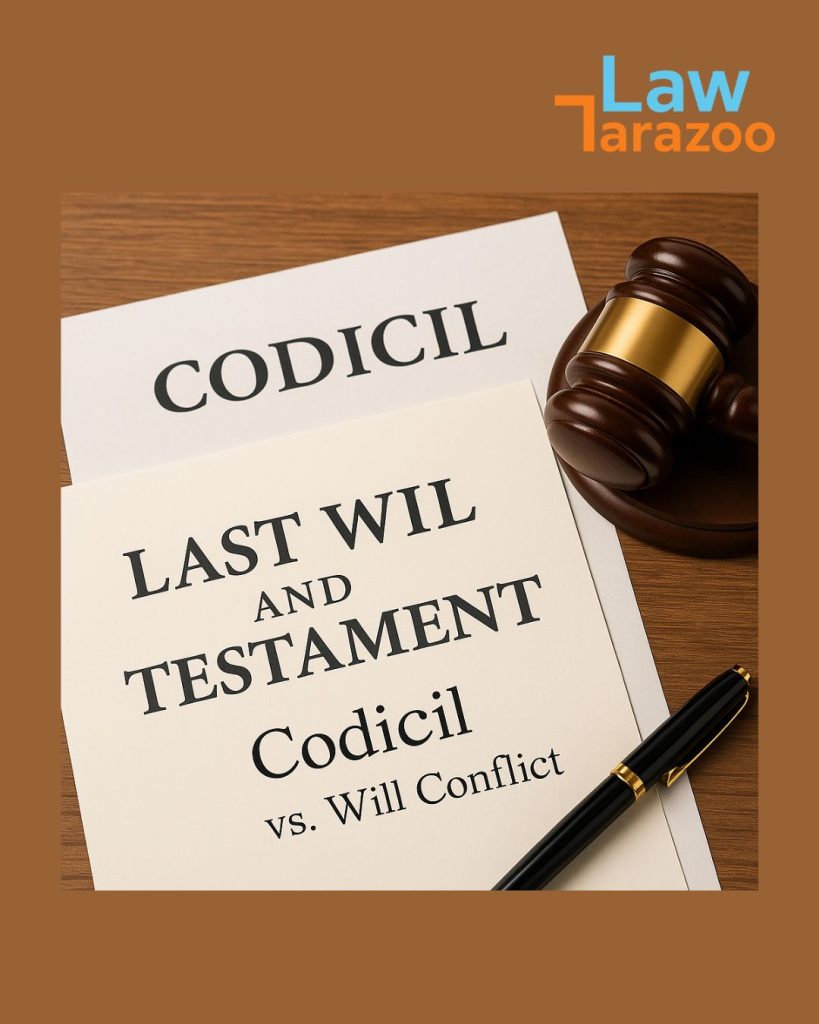
What Happens When a Codicil Contradicts a Will? A Legal Perspective for Indian Estate Planners
Creating a Will is a crucial step in ensuring that one’s final wishes are respected, and property is distributed according to personal desires after death. However, life is dynamic, and circumstances often change. This is where a codicil, a legal instrument used to amend or supplement a Will, becomes essential. But what happens if the codicil contradicts the Will? In Indian testamentary law, this situation is not uncommon and must be navigated carefully to preserve the testator’s intent.
At Law Tarazoo, India’s trusted platform for online Will-making, we frequently receive queries about codicils and their interaction with Wills. This blog explores what to do when a codicil contradicts a Will and how the Indian legal system resolves such conflicts.
Understanding the Role of a Codicil
A codicil is a written document that makes specific modifications to an existing Will without replacing the original Will. These modifications may include changes to executors, deletion or addition of beneficiaries, or altering bequests. Though separate from the Will, a codicil is considered legally connected to it and, once executed properly, forms a part of the Will itself.
Under Indian law, particularly the Indian Succession Act, 1925, a codicil must fulfill the same formalities as a Will. It must be signed by the testator and attested by two competent witnesses. Once this is done, the codicil is legally binding.
What if There is a Contradiction Between the Will and the Codicil?
Contradictions may arise when the codicil alters or negates a clause from the original Will. For instance, a Will might appoint a particular individual as the sole executor, while a subsequent codicil names another person for the same role. Or, the Will might leave a specific asset to one person, and a codicil later leaves that same asset to someone else.
In such scenarios, Indian law generally holds that the most recent document will prevail, provided it has been properly executed. The rationale is straightforward: the later document likely reflects the testator’s most current and final intentions.
Harmonizing the Will and Codicil
While courts prioritize the most recent document, they also strive to read the Will and codicil together harmoniously, wherever possible. The principle is that the testator did not intend to revoke any part of the Will unless it is explicitly or implicitly stated in the codicil.
Courts will attempt to:
- Determine the intent behind the codicil.
- Assess whether the codicil is meant to override or merely supplement the Will.
- Reconcile both documents to reflect the most accurate picture of the testator’s wishes.
However, where reconciliation is impossible due to direct contradictions, the provisions in the codicil will take precedence, if it is dated later and legally valid.
Legal Precedents and Interpretation
Indian courts have, in multiple judgments, emphasized that clarity in testamentary documents is vital. When facing conflicting clauses between a Will and a codicil, the courts rely on:
- The dates of execution.
- The presence of revocation clauses.
- Language that shows intention to substitute earlier provisions.
For example, if a codicil clearly states, “I revoke clause 5 of my Will dated [date],” this intention is unambiguous and enforceable. But if the codicil merely says, “I leave my gold chain to my daughter,” and clause 5 of the Will states that the gold chain should go to the son, then the courts will analyze the context to determine which clause reflects the genuine intent.
Practical Implications for Testators and Families
For the layperson writing or amending a Will, it’s important to ensure that each codicil is:
- Drafted with clear, unambiguous language.
- Executed with proper legal formalities.
- Stored together with the original Will.
- Reviewed periodically to avoid accumulation of multiple, conflicting codicils.
At Law Tarazoo, we guide users through each step of this process with our lawyer-reviewed, online Will-making platform. Our system prompts users to consider whether earlier clauses need to be updated or revoked, reducing the risk of unintended contradictions.
Why Legal Guidance Matters
A common mistake people make is assuming that a codicil can simply be written at home and appended to an existing Will without formal legal steps. This misconception leads to documents that may be invalid or open to legal challenges.
Inconsistent testamentary documents often become grounds for probate disputes. Beneficiaries may contest the interpretation or claim undue influence or lack of clarity. Legal oversight during the Will and codicil creation process ensures that the final wishes are both lawful and respected.
Conclusion
In the event that a codicil contradicts a Will, the latest valid document typically takes precedence, especially where it explicitly revokes or alters the earlier clauses. However, ambiguity can complicate interpretation, and courts aim to honor the true intent of the deceased by reconciling both documents where possible.
The best way to avoid such complications is through thoughtful estate planning. At Law Tarazoo, we make it simple for individuals across India to create legally compliant Wills and codicils online. Our intuitive platform is supported by legal professionals and ensures clarity, compliance, and peace of mind.
Author – Shravani Mekade
Call to Action
Have questions about amending your Will or drafting a codicil? Trust Law Tarazoo to provide safe, legally valid online Will-making services. Visit www.lawtarazoo.com today to get started with a Will or codicil that fully protects your legacy.
#CodicilContradiction #IndianSuccessionAct #OnlineWillIndia #WillVsCodicil #LawTarazoo #LegalWillDrafting #CodicilAmendments #EstatePlanningIndia #DigitalWillIndia #TestamentaryLaw
